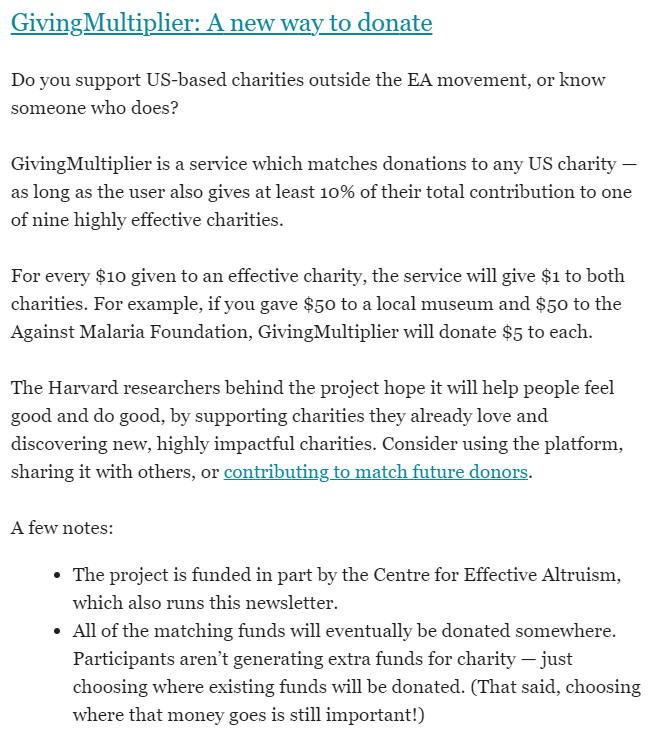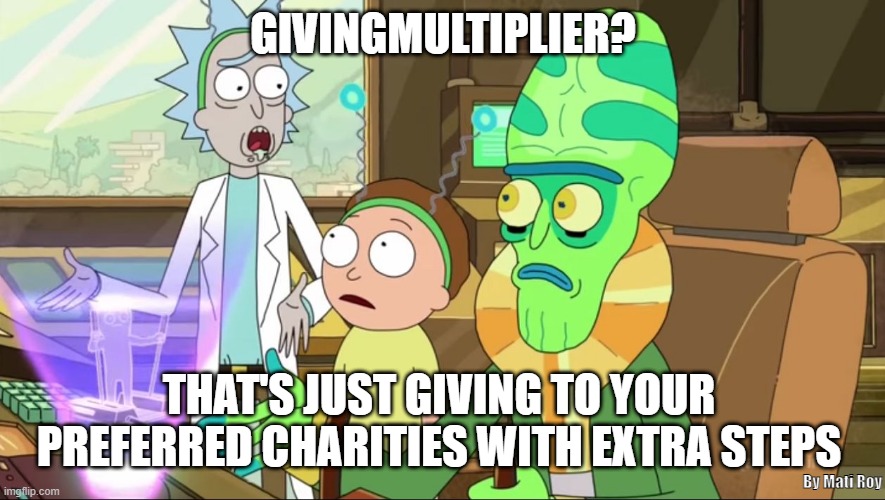-7
Reactions
1 Answers sorted by
Importance: not really important to read this comment
Update: I updated; see my reply
GivingMultiplier's description according to the EA newsletter^1:

Let's assume Effective_Charity and Local_Charity.
If you were going to give 100 USD to Local_Charity, but instead donate 10 USD to Effective_Charity and 90 USD to Local_Charity, GivingMultiplier will give 9 USD to Local_Charity and 1 USD to Effective_Charity, so there's now 99 USD going to the Local_Charity and 11 USD going the Effective_Charity. GivingMultiplier would give the money to Effective_Charity anyway. So for the donor, this is indistinguishable from donating 99 USD to Local_Charity and 1 USD to Effective_Charity, but it's done in a more obscure way.^2

Also, sure they are rather transparent about their process – at least in the newsletter; it wasn't obvious from the main page of the website –, but still, their scheme mostly works only insofar as people don't understand what's going on.
Potential motives
A bunch of people don't know Why you shouldn’t let “donation matching” affect your giving, and so they will be misguided by donation matches. If EA charities don't use them, then they might be at a disadvantage. So their reasoning might be that the game theory favors also using this technique under a consequentialist moral framework – sort of like a tit-for-tat with other charities, with deceiving donors as an externality.
One could argue that they should link to the piece against donation matching on their website, but maybe both memes are fit to different environments – maybe it would mostly reduce how much people use that specific service to fill their donation matching need, or something like that. I don't know, I'm trying to steelman it.
They might also want to know where people donate money, so they allow people to choose where some money goes among those 9 charities in exchange for knowing where they donate the rest of the money. And at the same time, they signal support for those 9 charities.
Consequences on the donors
If donation matches don't change how much donors give, but just where they give (which seems plausible to me), biasing them equally against all charities might actually help them make decisions that are more aligned with their worldview than if they were less biased with only a subset of them.
Footnotes
1) Their website is actually giving different numbers, but the idea is the same.
2) Sure, there's the real choice of choosing which of the 9 Effective Charities receive the money, but:
a) The part about local charities is a red herring
b) Those charities probably sort-of have reached market efficiency (in the sense that large donors can rebalance their donations according to how much total funding they want each of them to have)
(a) is my main objection.
I'm totally not a mod, but I thought I'd highlight the "Is it true? Is it necessary? Is it kind?" test. I think it's right in general, but especially important here. The Forum team seems to have listed basically this too: "Writing that is accurate, kind, and relevant to the discussion at hand."
I'm also excited to highlight another piece of their guidance "When you disagree with someone, approach it with curiosity: try to work out why they think what they think, and what you can learn from each other." On this:
- Figuring out what someone thinks usually involves talking to them. If posting here is the first someone has heard of your concern, that might not be a very good way of resolving the disagreement.
- Most people running a project in the community are basically trying to do good. It sounds obvious, but having a pretty strong prior on disagreements being in good faith seems wise here.
I agree with everything that Kit has said here. This post might have been in sufficient violation of the Forum's rules to remove (being slightly inaccurate and slightly unkind), but I'm leaving it up (without asking the author to consider changes, as I typically would -- see following comment) because I think Kit's comment suitably addresses my concerns.
EA orgs aren't run by angels. Any community where money changes hands will attract people who want to deceive others, with or without good intentions. But it's really good to reach out to people before accusing them of deception; they could be making an honest error, you could be making an honest error, or the issue could simply be a difference of opinion within a moral gray area. We're working in a field with many complex questions (moral and logistical), and the best first reaction to confusion is communication.
I should have been more clear on that point -- thanks for the comment. I've changed my reply to add the phrase "without asking the author to consider changes, as I typically would". I can see how the original reply could have been concerning.
On handling posts that may violate Forum rules:
My first act for any post that seems to violate rules is to contact the author and express my concerns; I've done this ~20 times in the last two years. (The exception to this is for a post that is in stark violation of rules -- e.g. an insult with no further content, or obvious spam.)
If the ensuing discussion doesn't lead me to change my view on whether the post violated a rule, and the author declines to make changes to the content in accordance with the Forum's rules, the post might (again, might) be moved back to "draft" status (we don't delete non-spam content -- we want the author to be able to share things elsewhere even if the Forum doesn't permit them).
Of the aforementioned ~20 instances, I removed content one time when the author never replied (this was a comment that shared provably false and inaccurate information about a named person in a way that was hard to correct with a reply). On one or two other occasions, authors chose to remove their work.
In every other case, I was convinced by the author, the author made light edits (generally of the "softening tone without changing substance" variety), or a discussion developed that seemed valuable enough for leaving the post up to be a net positive.
On private vs. public communication:
The big difference is that, in most cases, you can move from a private to a public discussion more smoothly than vice-versa. Once a public accusation has been made, confusion and concern tends to linger, whatever the substance of the accusation. You can see this in action when a false Tweet gets 50 times as many retweets as the correction.
Public accusations also tend to lead to bitter fights that could have been avoided with a private conversation: Forum User A leaps to defend the accused, Forum User B fires back, and meanwhile the person/org in question would have been happy to clarify their point/edit their website/etc. if only someone had told them.
(On that note, I've sent this post along to Lucius of the GivingMultiplier team.)
On handling posts that may violate Forum rules:
Thanks for the clarifications.
On private vs. public communication:
I don't want to argue for what to do in general, but here in particular my "accusation" consists of doing the math. If I got it wrong, am sure other got it wrong too and it would be useful to clarify publicly.
On that note, I've sent this post along to Lucius of the GivingMultiplier team.
Thank you.

You are right that if someone only cares about their favorite charity, then donating through GM doesn't give them any value. After all, GM never helps you to get more value for your favorite charity than you could get by donating directly to your favorite charity. But we also don't claim that we do that. On our website, we say: "Give to both your favorite charity and a super-effective charity recommended by experts. We'll add to your donations." (The EA newsletter text frames things slightly differently and perhaps that's indeed not the optimal way of promoting GM.)
But if someone cares about both their favorite charity and about giving effectively, donating through GM can get them more value. Keep in mind that our target audience are non-EA donors, many of whom haven't heard of EA or about our highly effective charities before.
In our studies we find that many non-EA people (ca. half of our MechanicalTurk participants!) are willing to split their donation 50/50 between their favorite and a highly effective charity when they are offered such a splitting option even if no matching is offered. This shows that surprisingly many people do have a preference to giv... (read more)
hummm, I guess it's fine after all. I change my mind. People can just give whatever fraction they were going to give to local charities, and then be matched. And the extra matching to effective charities is a signal from the matcher about their model of the world. I don't think someone that was going to give 100% to another charity than those 9 should use GivingMultiplier though (unless they changed their mind about effective charities). But my guess is that this project has good consequences.
(Epistemic status: Writing this in a hurry on my way to something else, trying my best to be accurate but I'd love to know if I miss any details. Also, not writing this as a mod or a CEA employee-- just doing my best to understand this organization.)
It looks like GivingMultiplier has changed their match structure a bit since I sent out the EA Newsletter, so that's not the best reference to use.
In any case, your argument has some questionable bits, whether you use the Newsletter's out-of-date numbers or the GivingMultiplier numbers.
First, the higher a... (read more)
I'm henceforth offering a MetaGivingMultiplier. It's the same structure than GivingMultiplier, but replace "local charities" with "GivingMultiplier" and "super-effective charities" with "a cryonics organization" (I recommend https://www.alcor.org/rapid/ or https://www.brainpreservation.org/). Anyone wants to take advantage of my donation match?
h/t: came up with this with Haydn Thomas-Rose